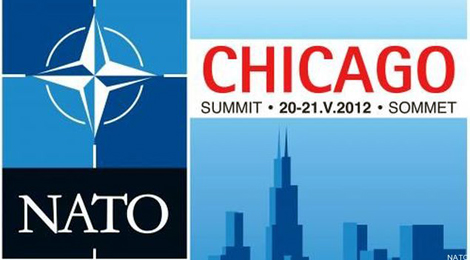NEWS
Slovenian Prime Minister Janez Janša at NATO summit
The Prime Minister of the Republic of Slovenia, Janez Janša, is attending the NATO Summit in Chicago together with the Minister of Foreign Affairs, Karl Erjavec, and the Minister of Defence, Aleš Hojs. The summit opens today with military ceremonies and with the meeting of the North Atlantic Council (NAC) at the heads of state level.
Before the summit itself, Prime Minister Janša explained in a statement to the Slovenian media that NATO's post-Cold War development stage is coming to an end, and that the conclusion of the NATO mission in Afghanistan is also imminent. Therefore, this summit will focus particularly on reflecting about NATO's future role. According to the Slovenian Prime Minister, this summit will not come to any NATO enlargement decisions, "although certain steps will be made in this direction".
The Prime Minister believes that the North Atlantic Alliance has long overgrown its geographic borders, and is now one of the key tools in preserving world order and maintaining peace. In the Prime Minister's opinion, this new role essentially transcends this organisation's initial objectives, which were set at the outset of the Cold War, and so NATO has attempted to overcome this transitional period by embarking on several partnerships. "Besides NATO's member states, this summit will also be attended by representatives from several other countries and international organisations; the participants will include the Secretary-General of the United Nations, the President of the Council of Europe, and the leaders of Australia and other countries, which makes this summit a global meeting devoted to world peace," the Prime Minister explained.
As regards the alliance's mission to Afghanistan, the question as to how to prepare for the period after withdrawing from Afghanistan, and Slovenia's participation in the process, the Prime Minister said that Slovenia's participation would be reduced, "but we will remain there until the end of the mission". In his words, it would be extremely unreasonable to "abandon the substantial joint efforts made for Afghanistan by quitting a few months before the end of the mission". The Prime Minister brought up the fact that Afghanistan is now a considerably safer area for millions of people, that its children may attend school again after long years without access to education, and that the right to schooling has now been granted to girls – who were previously denied access. "Within some relative norms, Afghanistan has become a more or less normal country, but the whole international community will need to provide assistance in order to help the foundations of civil society and economic progress develop further after 2014," the Prime Minister cautioned.
He also touched on the predicted retreat of French combat forces. "The promises made before the election are known to everybody and will be probably respected – even if not literally," he said. He was of the opinion that, in order to compensate for the retreat of its combat forces, France would in all likelihood contribute more resources to the Afghan National Security Forces, or compensate in some other way.
As to the additional question concerning possible NATO enlargement, the Prime Minister confirmed that Slovenia was amenable to NATO's open door policy.





